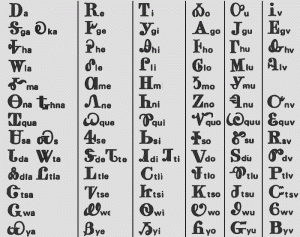Why I chose to learn Tsalagi as research

Learn a new language as research? Crazy lady! I decided to learn Tsalagi/Cherokee over the next five years. Logical, since I have [almost] nobody with whom to speak this new language? No! But I have found a way to work it in and have about a week left of syllabary learning. Then it is on to the language basics.
I want to make a believable and respectful representation of people in my novel's time period
By the late 1820's, after George Guess (or George Gist/Sequoya) developed the Cherokee Syllabary, most of the Nation read and wrote this language. It was important to read the news and communicate at that time. Laws and treaties were being made without them being able to verify any information. At least with this written language, they could have something with which to create and preserve their own government.
I have some Cherokee characters in my series, but most are only half Native. Given the time period and circumstances, they experience a rapid loss in culture and language. What that means for me is that I need to explore what this loss entails and how to present it accurately and with respect. History books are not enough. The internet is not enough. Cherokee/English dictionaries will have me using any one of seven words for the same object, and I know I am in deep you-know-what if I choose the wrong one.
Language is the way into culture, forgotten or otherwise
I am encountering countless things every day that enrich my characters and plot, and understanding of respect actually means (it's not the same across the board!)
I realized while researching words, meanings, traditions, etc. that some concepts in English do not exist in other languages. Take for example, "goodbye." English uses this often. "Goodbye" for early Cherokee was too final. They would rather have said the equivalent of "be strong" or "let us see each other again."
Another example is Aniyvwiya, or the Real People/Principal People. This is how the people used to refer to themselves. Since the nation was matrilineal, only people with Cherokee mothers were Aniyvwiya. If I had not dived right into the language, I would have used it incorrectly. Half of my characters do not have Cherokee mothers.
Even though early culture was fairly documented by both English and Cherokee speakers, there are few ways to accurately experience it halfway across the country in the 21st century. In this case, the internet, library, and databases have been beneficial to connect with material and native speakers involved in history. Not every Native American knows exactly what happened 150 years ago. Do I know what happened 150 years ago in Hungary? Nope! To put that burden on a friend or stranger just because they are Native, is unfair.
So far I have learned enough to make significant changes in my Book One narrative, family dynamics being the most changed. David and Sarah are part of a broken and blended family and they live their early years on the fringes of a dying culture (to them. Cherokee culture is alive and well today!). Having a white mother means more than being a little confused. Since bloodlines were carried through mothers, they had no clan membership. No clan membership means no protection, at least not the depth they will need.
Languages are disappearing
Very few people speak the dialect I am learning, and yes, maybe I will have to learn another to actually talk with people, but it is better than it dying out. A dialect of this language has already died. *Update! I'm switching to Oklahoma dialect with an author's note.
Even a written language can be in danger of dying out. Fires can and have destroyed entire libraries of original documents across the world, and languages are in trouble. 2019 is suitably the International Year of Indigenous Languages.
Language learning is important for spelling accuracy
Not only am I learning to accurately form an image of what their lives were like, I am not going to copy and paste incorrect words into my story. More on that in my upcoming post: Chasing Aginili.
To follow my progress each weak, check out my Instagram.
Before you go
It is so important that people realize Cherokee language and culture are alive today! I encourage people to see out resources to learn about current and historical events from Cherokee perspective. Be aware also that there are and were varied politics within the Nation, so one piece of literature may not represent the entire way of thinking.
[embed]https://www.instagram.com/p/BwuMZrDH8cS/[/embed]
